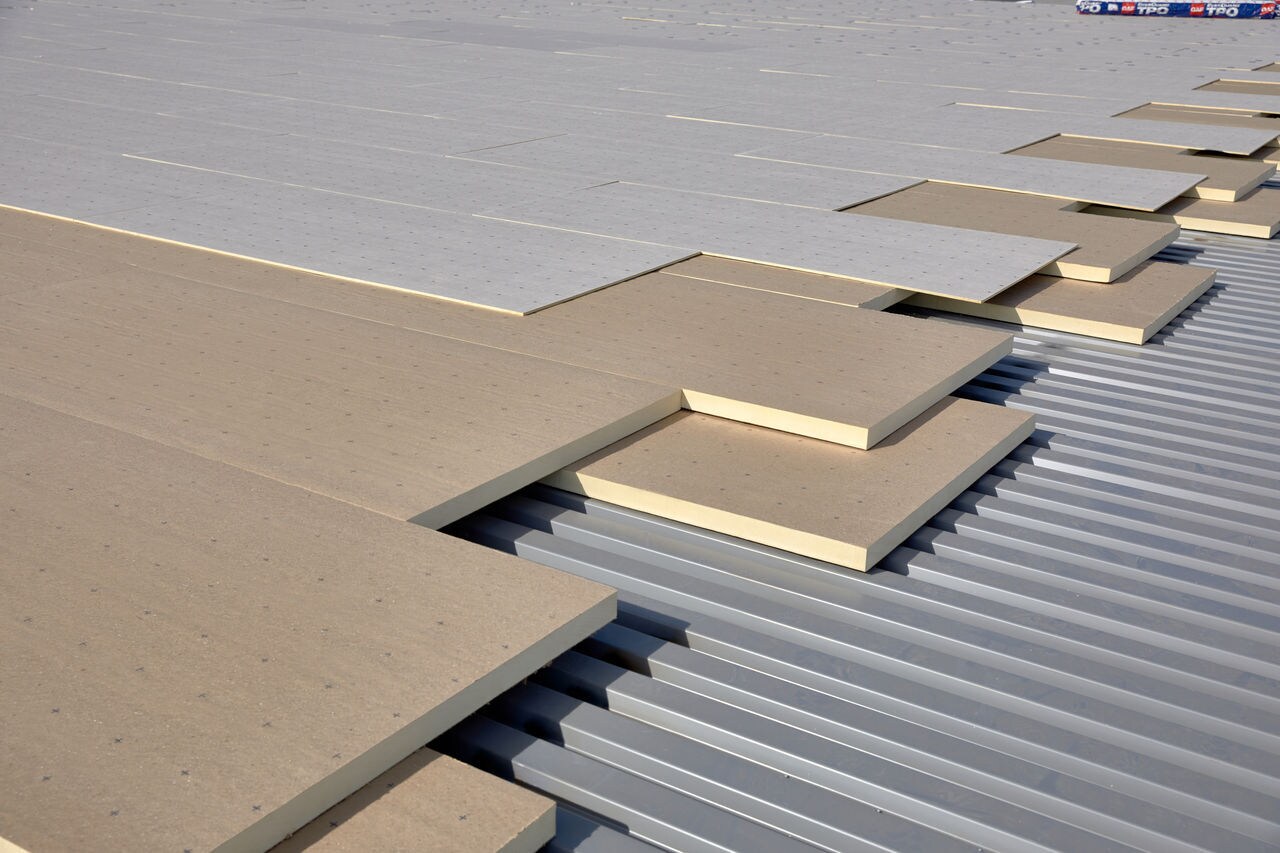When starting a commercial roofing job for a client, choosing the right type of materials is one of the first—and arguably most important—steps. Selecting the proper products can help you stay within budget while meeting the requirements of strict building codes.
One important choice commercial contractors and architects must often make is choosing between polyiso or gypsum cover boards. While each option has its own benefits and drawbacks, HD polyiso cover boards also offer a unique advantage that can have a real impact when it comes to insulation.
What to Know About HD Polyiso vs. Gypsum
The area where HD polyiso really outperforms gypsum is when it comes to R-value. GAF EnergyGuard™ HD Barrier Polyiso cover boards have an R-value rating of 2.5, while gypsum cover boards have a negligible R-value that often adds little to nothing to the building's insulation. However, there are also other advantages—HD polyiso also provides more protection against moisture and can save time during installation.
Higher R-Value For Insulation Building Codes
If you're using combustible decks like wood planks and plywood, you may have strict R-value requirements you need to follow in order to adhere to building codes. The R-value rating of HD polyiso makes it the best choice when insulation is a concern.
Most building codes require an R-30 value to be compliant. When using HD polyiso, you can opt to use thinner boards underneath, or one less board overall, since the layers below will only need to add up to an R-value of 27.5. This can enable you to switch from using two boards of 2.6 ISO to one board of 2.2 ISO and one board of 2.6 ISO—or two boards of 2.4 ISO.
When you're working on massive projects where multiple layers are needed across vast square footage, you can help save potentially thousands of dollars simply by using thinner boards. Architects with budget concerns and local regulations in mind can benefit by choosing HD polyiso over gypsum.
Enhanced Moisture Protection
HD polyiso is made up of a high-density polyiso foam core and durable coated glass facers that provide extra moisture protection and help with adhesion. Meanwhile, gypsum is composed of a fiberglass mat with the gypsum material core.
Due to its foam build—which doesn't absorb water—HD polyiso offers more moisture protection than gypsum. It also passes the D3273 test, which shows it resists mold growth. Gypsum can degrade when faced with standing water or moisture leaks, making the material susceptible to expensive repairs or replacements.

Faster Installation Process
HD polyiso cover boards also feature a lightweight build. This can make a big impact when you're trying to transport materials to the jobsite and move them around the area. Trucking 1000 squares of HD polyiso might only require two trucks, whereas 1000 squares of gypsum would require up to six trucks due to the difference in weights and packaging.
This lightweight design also makes a significant difference during the installation process since HD polyiso is easier to handle and maneuver. HD polyiso is also easier to cut through with a roofing knife, whereas gypsum requires the use of more heavy-duty power tools. Using HD polyiso can even simplify the craning process, as you can easily lift more material at one time and reduce the strain on your equipment. The installation time for HD polyiso is much less than that of installing gypsum, which can be a strong selling point for building managers.
Benefits Offered by Gypsum Cover Boards
Of course, gypsum has its own advantages to consider. For instance, gypsum cover boards tend to offer better compressive strength. While HD polyiso boards can offer PSI strength of 80 to 120, gypsum tends to have higher numbers of 700 or more. Roofers and architects will need to determine whether this additional strength is necessary.
Fire resistance is another area where gypsum excels, as it's non-combustible. The material can stop the spread of a fire from reaching the roof deck below. However, certain HD polyiso products like GAF EnergyGuard™ HD Barrier Polyiso cover boards also offer Class A Fire Resistance, which is the highest level of fire protection.
Why Choose GAF's EnergyGuard HD Barrier Polyiso
In addition to its R-value, moisture resistance, and ease of installation, EnergyGuard™ HD Barrier Polyiso cover boards have an ANSI UL790 roof rating over combustible wood decks. They're also very durable, featuring an 80 PSI rating that can handle roof impacts like foot traffic, hail, and most weather-related events.
Weighing in at 11 pounds per 4' x 8' board, GAF HD polyiso cover boards are lighter than gypsum. This prevents the material from adding unnecessary stress to roofs. Its light weight and ability to meet R-value building codes make it a good choice for commercial projects, and since you don't need to use a slip sheet during installation, you can potentially save more on material costs.
Ensuring Project Quality with GAF
GAF EnergyGuard™ HD Barrier Polyiso is a high-quality product with high ratings for industry tests that even other HD polyiso products can't easily match. Combined with its ability to save time and money on the jobsite, it's definitely worth considering for your next project.
Curious to learn more? Visit the product page or reach out to your GAF territory manager to discuss its many advantages.

